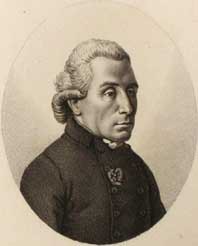(1759-1837), French clergyman and ambassador
“The most severe judgements accumulate beneath his master of intrigue, his lack of scruples and his great intelligence, all characteristics which could only make his official protector, Talleyrand, appreciate him more”, writes Bernard Plongeron. This “quintessentially Auvergnien figure” (he seems to have walked straight out of a novel by Balzac) was born in Allanche in the Cantal region on 23 April, 1759. The nobility of his family was recognised by royal ordinance on 17 March, 1668.
He was first brought up at the military school of La Flèche, after which he studied theology at the Sorbonne and was then ordained priest, without any great enthusiasm, on 29 June, 1783. He was immediately made vicar by his relative, Cardinal de la Rochefoucauld, archbishop of Rouen, and was then elected to the Estates-General in 1789 by the clergy of Normandy. He used his skills to marvellous effect, but had to emigrate in 1791. He first stayed in Britain, then in Brussels. He published his Antidote to the Congress of Rastadt in Hamburg, which earned him great fame. He returned to France in 1802. Duroc recommended him to Bonaparte, and on 10 July, 1804, he was appointed general chaplain to Napoleon, “chaplain of the god Mars”, he added with spirit. He was master of ceremonies on the occasion of the coronation. His reward was not long in coming: on 15 December, 1804, he was made archbishop of Poitiers. As he had to accompany the Emperor to Milan as a chaplain, he did not arrive in Poitiers until 21 June, 1805. He did not spend much time in his diocese, more interested in diplomatic affairs, namely the beginning of the Spanish question.
On 1 May, 1808, Napoleon appointed him to the archbishopric of Mechelen. However, the new archbishop faced hostility from the metropolitan chapter as well as the stevenist priests, Belgian dissidents from the Petite Eglise. Conflict with the pope worsened his situation. He sided with Napoleon's views, and published an anonymous brochure On appointed bishops, being sent to vacant churches to take possession of them. He claimed that it was possible, and even necessary to manage the diocese without the pope's participation. He was the Emperor's agent and entered the Second Ecclesiastical Committee, which was destined to reorganise the Concordat. He may not have been part of the first delegation sent to the pope in Savona, but he distinguished himself with a long letter he sent, asking Pius VII to be more obliging towards “the new Cyrus who granted liberty and their native country to more than 100,000 of the clergy and who restored thirty million French people to the faith. He brought the Church back to Catholics in all the countries in which he bore arms. Surely such brilliant acts are the surest guaranties of his intentions?” Pradt pleaded in favour of signing two agreements, one to deal with the problem of the canonical institution, and the other to handle the general problems of Christianity. During the council which was held in Paris from 17 June – 5 August, 1811, along with Duvoisin and Barral he was among those who held imperial positions against ultramontane loyalists: Broglie, Boulogne, d'Aviau and Hirn. He was a member of the second deputation sent to Savona, at which he opposed Barral, more prudent. He thought, as did the generals and negotiators of the time, that audacity commanded victory.
As a reward for his loyalty, Pradt was sent to Poland as an ambassador. This was to be the French base in the now inevitable war against Russia, a war which Napoleon intended to carry out with “Polish blood”. Pradt left an account of his mission, in his History of the embassy in the grand-duchy of Warsaw in 1812, in which he describes Napoleon as “Jupiter-Scapin”. This account, published after Waterloo, incurred the wrath of Napoleon (Memorial, 15-16 December, 1815). In fact, he failed in his mission and was held responsible for the disaster of the Russian Campaign. As he passed through the Duchy on 16 December, 1812, Napoleon dismissed him from his post as ambassador. When Pradt arrived in Paris, on 13 January, 1813, he was informed that he was no longer general chaplain. After having returned to Mechelen, he was forced to abandon his diocese in January 1814. He then schemed with Talleyrand to hurry the return of the Bourbons. Louis XVIII made him Grand Chancellor of the Legion of Honour. Remarkably, under the Second Restoration, Pradt joined the liberals, after having resigned from his archbishopric on 3 August, 1815. In 1818, he published The Four Concordats, in which he took “anti-Roman” stances which must have pleased the exiled Emperor on St Helena and led him to revise his judgment. Pradt continued to be a leading character during the Restoration: he wrote a number of books (including the curious Europe and America in 1821, 1822), was a Member of Parliament for Clermont in 1827, was prosecuted where he appeared in his full regalia and was then acquitted. He died in Paris on 18 March, 1837.
Author: Jean Tulard, trans. L.S.
Dictionnaire Napoléon, 1999, Fayard
Reproduced and translated with the authorisation of Editions Fayard. All rights reserved.


